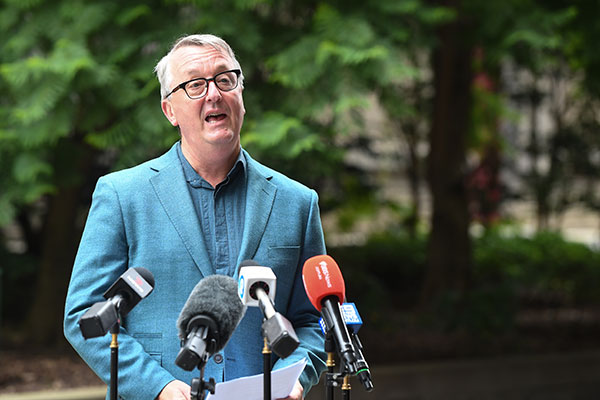
Seven-day isolation for COVID-19 close contacts, compulsory masks for primary school students and the vaccine mandate for venues will be scrapped in Victoria.
A raft of restrictions will ease from 11.59pm on Friday after the state passed the peak of its second Omicron wave, Health Minister Martin Foley announced on Wednesday.
"We know that there will be a long plateauing and tail to this BA.2 Omicron sub-variant wave," he told reporters.
"But what we know is that we've passed the peak and we are able to look to this group of sensible measures being able to take us into a still-challenging winter."
Under the changes, close contacts of confirmed cases will no longer have to quarantine if they wear a mask indoors, avoid sensitive settings and return five negative rapid antigen tests over the seven-day period.
Similar changes have been unveiled by the NSW government.
Business groups have been calling for the seven-day isolation rule for household contacts to be relaxed to ease ongoing staff shortages.
Positive cases still need to self-isolate for the full seven-day period in Victoria and masks will remain mandatory on public transport, in airports and health, aged care and justice settings.
In addition, Victorians will no longer be required to have two vaccine doses or show their vaccination status before entering pubs, restaurants, movie theatres and sports venues.
Premier Daniel Andrews previously said the state's vaccinated economy could remain in place until 2023.
COVID-19 vaccine mandates for key industries such as healthcare, food distribution, police, emergency services and education will remain.
The state's new pandemic-specific legislation shifted the power for changing COVID-19 restrictions from Chief Health Officer Brett Sutton to Mr Foley.
Professor Sutton said health policy was transitioning to individual discretion, given the level of vaccination coverage in the community.
"We've got enough in-built protection as a community that further restrictions are not proportionate or necessary," he said.
Victoria's seven-day case average remains below 10,000, despite the state recording 10,628 new COVID-19 cases and 14 deaths on Wednesday.
Prof Sutton said he believed the wave had plateaued, with daily infections falling 10 per cent over the past week.
"I think today's a blip. It's going to be a long tail and slow decline. We're not going to see a dramatic drop in numbers," he said.
Prime Minister Scott Morrison welcomed the changes.
"In NSW and Victoria they are getting back to normal - hallelujah," he said.
© AAP 2022
Photo: Victorian Health Minister Martin Foley in 2021. (AAP Image/Erik Anderson)